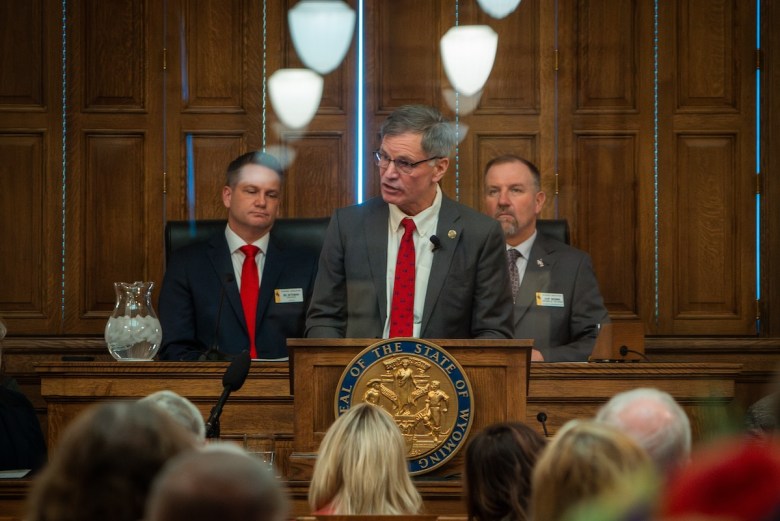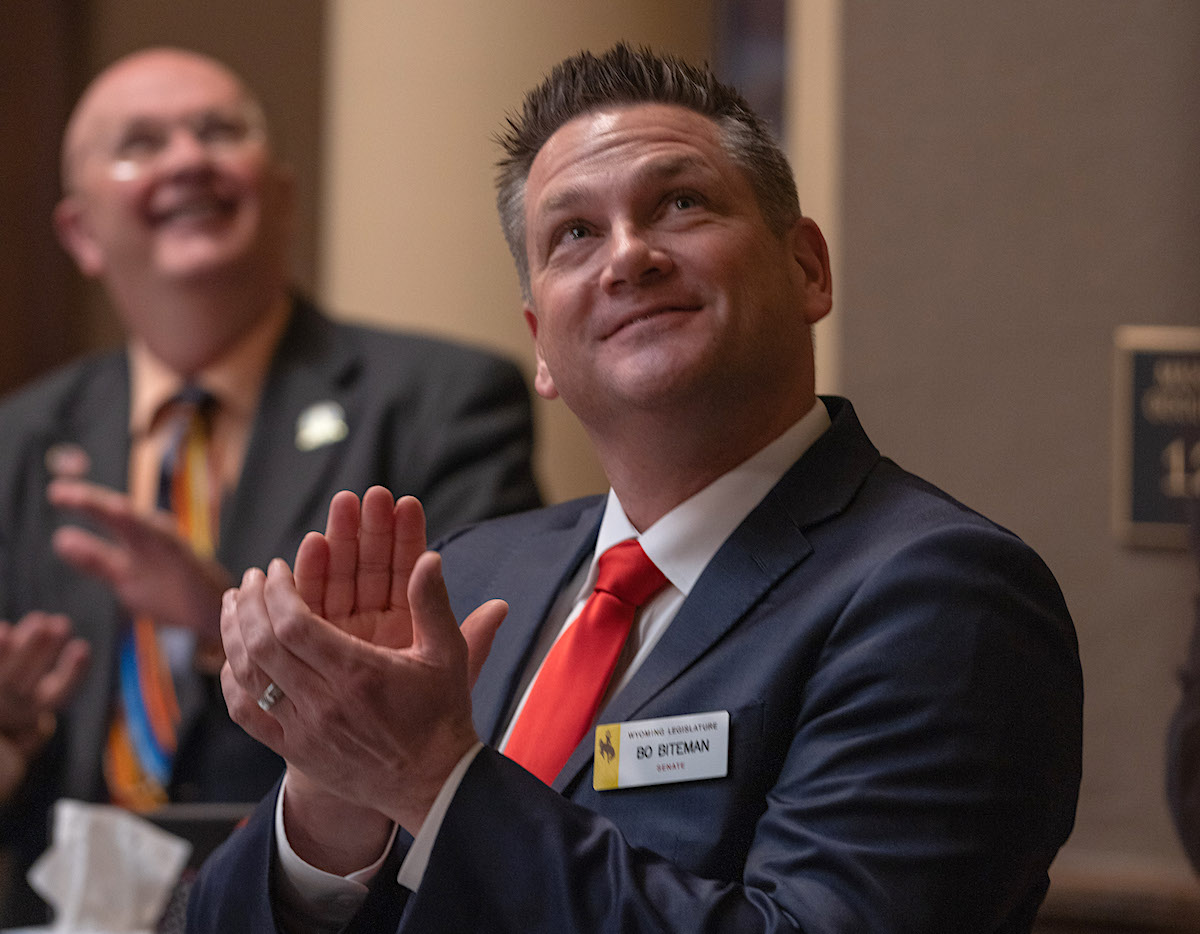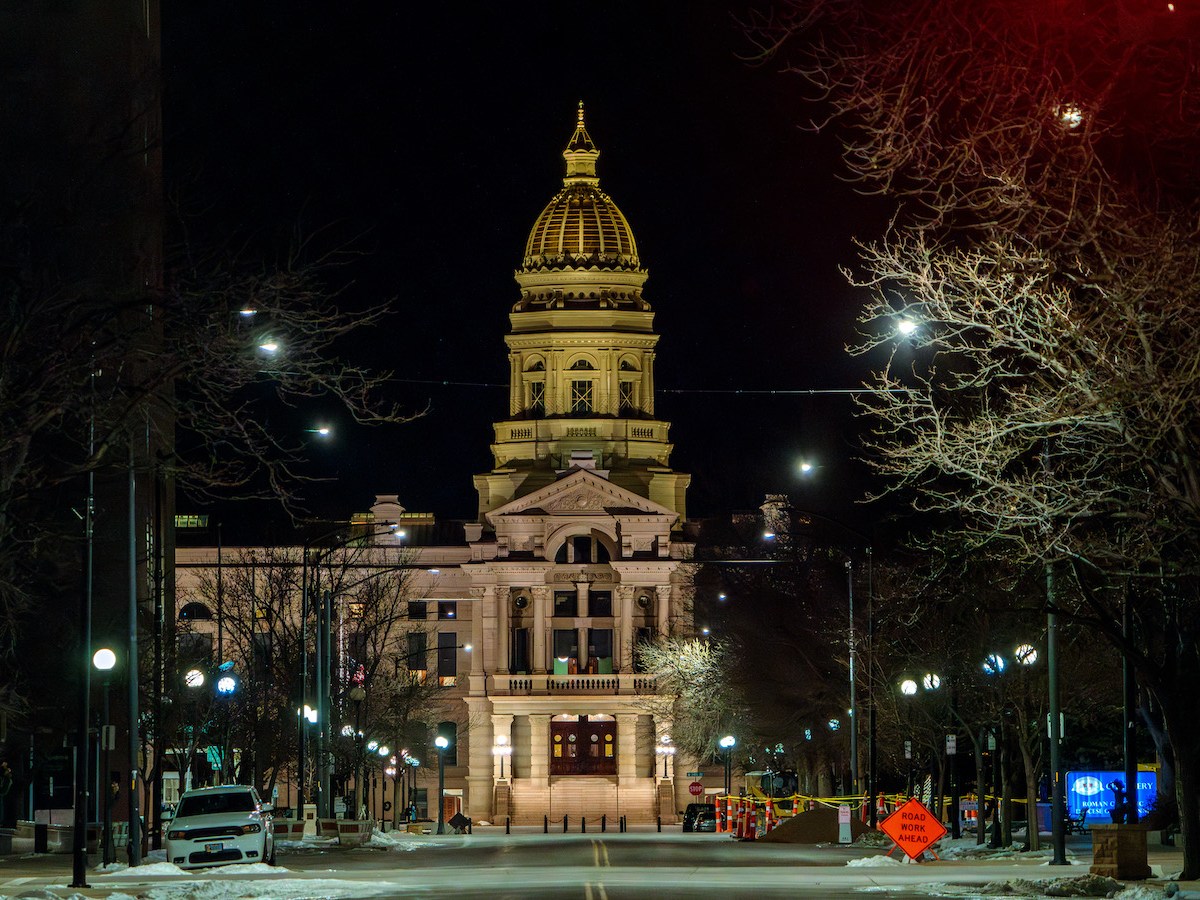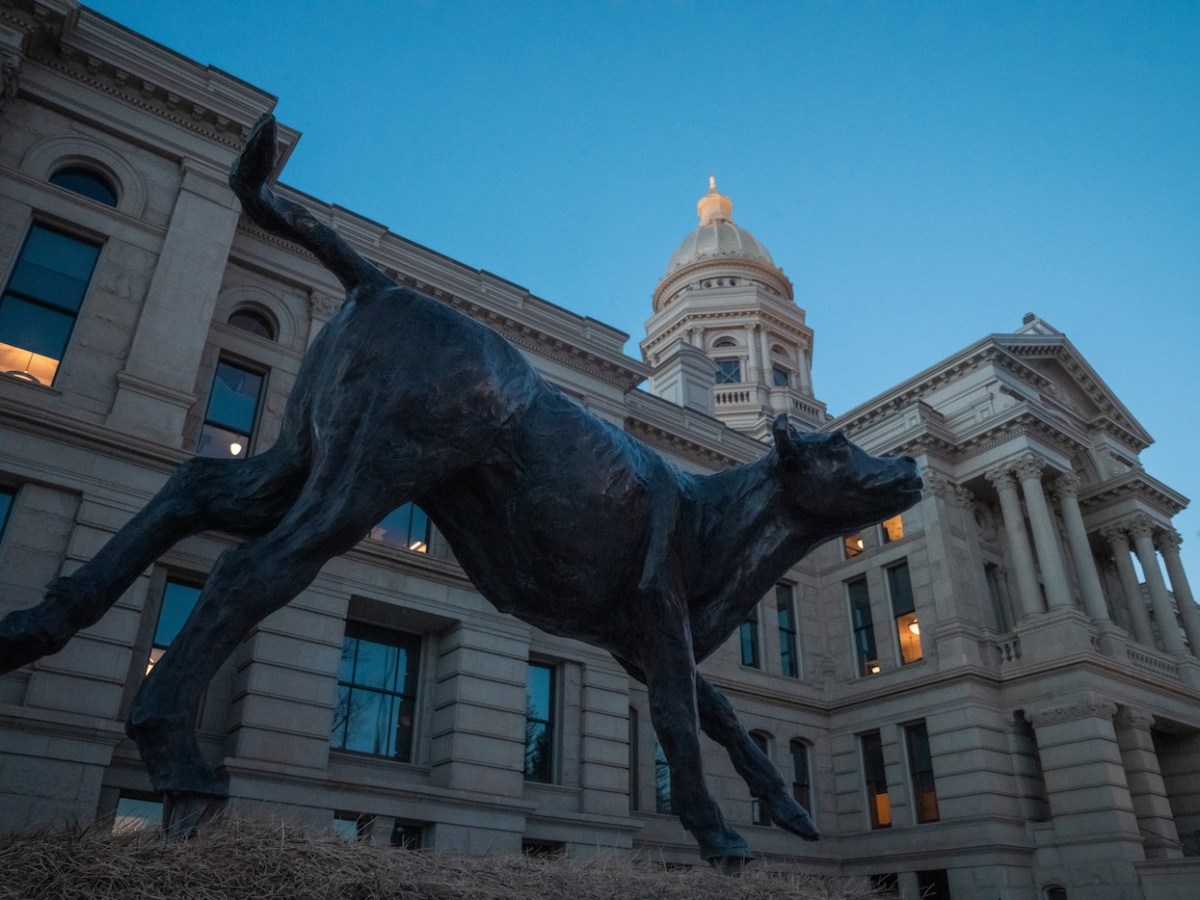Lawmakers and lobbyists scrambled Thursday to find new homes for their funding priorities by inserting them into often unrelated bills after the Wyoming Senate jettisoned the state’s supplemental budget bill the night before.
After many long days and late nights of debate in both chambers, Senate leadership announced Wednesday evening they would not pass a supplemental budget, sinking for the first time in recent memory the Legislature’s method for adjusting spending levels halfway through the state’s two-year budget cycle.
With it gone, lawmakers took to unconventional maneuvers Thursday to try and ensure their favored spending initiatives would survive the increasingly topsy-turvy session.
Sen. Larry Hicks, R-Baggs, sought to stick a $10 million appropriation for a shooting range in Cody into the state’s water infrastructure construction bill.
Down the hall, Rep. Lloyd Larsen, R-Lander, successfully extolled his colleagues to place $500,000 for an agreement with the University of Utah to educate Wyoming medical students into a bill banning diversity, equity and inclusion programs.
Lobbyists for health care programs scrambled to find a home for $4 million to fund a program for preschool children with disabilities.
Rep. J.T. Larson, R-Rock Springs, unsuccessfully tried to insert a $15 million grant program that supports local government infrastructure projects with mineral royalty funds into a bill regulating how the state invests its considerable stock portfolio.
Legislative chaos, generally speaking, reigned.
Gov. Mark Gordon kicked the day off with a statement sharply criticizing lawmakers for rejecting his “carefully analyzed, well-vetted” budget.
“This Legislature has overlooked emergencies and ignored unanticipated expenses in a quest for political talking points,” he wrote. “This is what occurs in a ‘no compromise’ environment.”
He concluded his statement with a quintessentially Wyoming piece of colloquial criticism. “It is hard to raise a calf or drill a well on rhetoric alone,” the governor wrote.

Gordon called on lawmakers to ensure a few key funding priorities survived. Those included money for fire suppression and recovery initiatives for the historic wildfires that swept the state last summer. He also included funding for an ongoing property tax relief program, and an inflation adjustment to school funding.
On Wednesday, hours before the Senate sunk the budget bill, a Laramie County judge ruled that lawmakers have underfunded public schools, in violation of the state’s constitution, for years. The ruling will likely require lawmakers to pump considerably more money into public education, even as they hope to cut spending.
Lawmakers have already found alternative vehicles for Gordon’s biggest spending priorities through other bills. On Monday, senators added the inflation adjustment for school funding into a separate education bill. A bill creating a wildfire management task force now includes $100 million in loans for ranchers and another $49 million in grants for conservation districts so that both entities can pursue wildfire restoration projects.
The future for those bills is hardly settled, however, as the House and Senate disagree on whether to deliver such relief funds as loans or grants. The Senate generally prefers grants, mirroring Gordon’s position.
It remained unclear Thursday whether and how lawmakers might set up a program to reimburse towns and counties for the revenue lost to local governments through the property tax cut. As it currently stands, Senate File 69, “Homeowner property tax exemption,” the bill through which both House and Senate leadership have agreed to cut property taxes in every county by 25%, does not carry any measure to backfill.
But what is more likely to fall by the wayside amid the inter-chamber jousting are spending measures with smaller political constituencies. Funding for behavioral health and maternal health care programs appeared unsure of a new home.
Employees of the Wyoming Office of Tourism were also snubbed by the Legislature’s decision to ditch the budget bill. That bill contained a roughly $500,000 appropriation to provide pay raises to those state employees, who have fallen behind on salary increases. Since the tourism promotion agency was moved off the general fund and is supported by lodging taxes, those employees did not get broad raises that went to other state workers.
“It’s unfortunate that the hard working staff at the office of tourism is going to have to wait another year,” Chris Brown, executive director of the Wyoming Hospitality and Travel Coalition, said.
The lack of a supplemental budget bill has also raised constitutional questions for lawmakers, as the state constitution sets guidelines ensuring that bills only address a single, cohesive topic and that their contents don’t stray too far from what their title would imply. Lawmakers on Thursday repeatedly questioned each other’s amendments, as funding for programs was shoehorned into bills that had nothing to do with them.
“This, in my opinion, is blatantly unconstitutional,” Rep. Landon Brown, R-Cheyenne, said during debate on Larsen’s medical school amendment. “Just because this has happened does not mean we go into crisis mode and start doing things unconstitutionally.”
House Judiciary Committee Chairman Art Washut, however, offered a different opinion. The House had already adopted the spending program once, Washut noted. “The body on the other end of the hall just told us to go pound sand and I think it’s time for us to stand up for our position,” he said.
Representatives adopted Larsen’s amendment, however, with a 32-27 vote. Senators voted later in the day not to adopt the House’s amendments, signaling the uncertainty that will continue for spending initiatives that are now scattered across the legislation. The anti-DEI bill, and its ride-along medical education spending amendment, will go to a conference committee.





I have a question for everyone reading this, whether Republican, Democrat, Independent, or whatever. If you were a business owner looking to hire the most qualified, most productive employees to fill a position with your company, would you hire any of these legislators?
The state constitution mandates just one duty to the legislature and that is to pass a budget to pay the state’s bills, yet they cannot do it. Consider the question I asked when the next election comes around.
I agree Shawn, but Congress also can not seem to get a budget passed. Federal fiscal year ends September 30 and here we are, March 1, with nothing but CRs done………..ridiculous. I think that there are some politicians who should be fired and this can be on their termination notice “your knowledge, skills and abilities no longer match the necessary level of expertise or competency required for the position” or “based on your performance, you have not demonstrated that your further employment would be in the public interest”! Maybe President Trump should send each member of Congress an email asking for 5 things they accomplished last week.
Unlike the federal government which has $40 trillion in debt, that state of Wyoming has $30 billion in savings so while all these Freedom Caucus members are trying to act like President Trump and crack down on government spending they don’t need to.
In your first statement your comparing apples to watermelons. The Fed Budget, debt/revenue is about 1.8 trillion dollars in large part because of Trump’s big tax cut for major corporations/wealth during his first term. When people mention the total debt they always forget to add the fact that the federal gov gets revenue and don’t factor that in. The last 6 presidents, all promised to the decrease the fed budget deficit(costs/revenue). Three did, all Democrats. Clinton started with a deficit but left a Fed Budget Surplus after his term. Then little Georgey Bush came after and took the Fed Budget back into deficit. So, yes your total debt is correct but revenue must be included for a true fiscal comparison. Here are the exact numbers. In FY 2024 total government spending was $6.75 trillion and total revenue was $4.92 trillion, resulting in a deficit of $1.83 trillion.
This is completely nutty. You get what you vote for, Wyoming